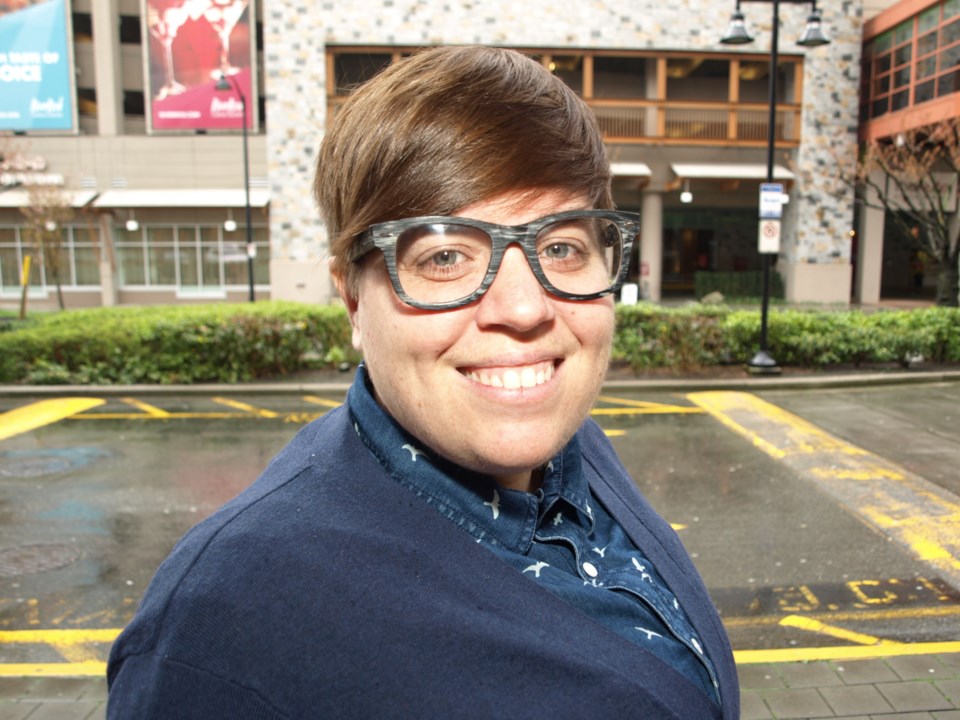Shelley Moore walked past the iconic red letters of the TED Talks brand, stood centre stage and told the crowd she’s a geek — an inclusion geek. For 15 minutes she explained why she believes in inclusive education, and how she learned an important lesson under a classroom table.
Her talk, “The Importance of Presuming Competence,” was part of the recent TEDxLangleyED event, an education-focused day of presentations in the style of the popular TED series.
“It was one of the top three days of my life. It was phenomenal,” says Moore, an education consultant with Richmond School District, over a late-morning coffee. “You feel like you’re part of something bigger.”
Now, back under the table.
Early in her career at Matthew McNair secondary, Moore met Daniel, a deaf-blind autistic boy with Down syndrome who was clutching a dictionary. Her challenge? To get him out from under a table. Conventional strategies — including luring him with Diet Coke — failed, but she learned Daniel loved math.
Moore pulled out flashcards and posed math questions, but Daniel would only respond by flipping pages in his dictionary. Then she noticed it. Daniel was answering the math problems by locating the corresponding page number in his dictionary. Moore connected with Daniel — and he followed her out from under the table.
Daniel was ready to learn, only differently, and he taught Moore the importance of presuming competence.
“If you don’t believe people are capable, then inclusive education isn’t going to go anywhere,” says Moore, who is completing her PhD at University of B.C. “Kids without disabilities are benefiting from having these kids here whether it’s from social, emotional well-being or tolerance and celebration and acceptance of diversity. My research is around how to capture how kids are benefiting in learning by having these students there.”
Born and raised in Edmonton, Alta., Moore completed her education degree at University of Alberta. On her last day of classes, she boarded a bus for New York. Three days and 79 stops later, she was in the Bronx, where she spent two years teaching in a challenging Grade 4/5 classroom.
She later landed on the West Coast, putting her special education training to work in Richmond. She worked with high school students with special needs for several years before entering her current role as a district consultant supporting students with developmental disabilities.
“Originally, I wanted to work with students who were at risk, because that was my profile,” she says. “I was categorized as a student who had behaviour difficulties and a learning disability, so I really struggled through junior high, high school and university.”
It’s because others realized she needed a different path — and gave it to her — that Moore is an advocate for inclusive education.
“I really believe in it. I’ve seen the magic. I see the potential,” she says. “I lived this my whole life.”
Besides being a sought-after speaker, Moore is also a blogger and author, with her first book, One Without the Other: Stories of Unity Through Diversity and Inclusion, set for release in June.
That theme carries over into her work at UBC, where she teaches a course and is completing doctoral research centred around finding value in inclusive education — namely how special needs students, supported by adequate resources and goals, affect the learning of other children. Moore recently distilled her research into a three-minute video using the game of bowling to make her point, netting her a $3,000 prize in the Social Sciences and Humanities Research Council’s 2016 Storytellers challenge.
“A lot of the research right now is very much around social skill and social goals, but I really want to capture how these kids are learning from each other,” she says. “If we’re going to change teachers’ minds, they need to see that inclusion is actually something that is effective and efficient in the learning community, otherwise I think they see it as something they do off the side of their desk.”
Moore says there’s growing recognition of the contributions made by students with special needs and that inclusion helps kids become good people. She says it’s an idea supported by a new curriculum based on strengths, not weaknesses.
“Rather than trying to fix kids, we’re trying to figure out what they’re good at,” she says. “The harder we try to make people the same the more we’re going to lose that battle because diversity is such a reality, especially now in Greater Vancouver.”



